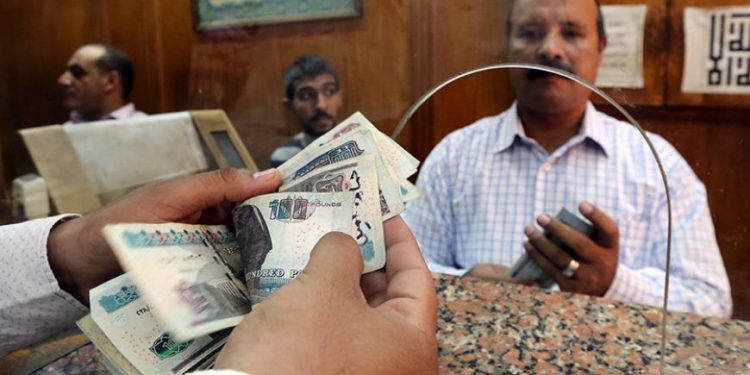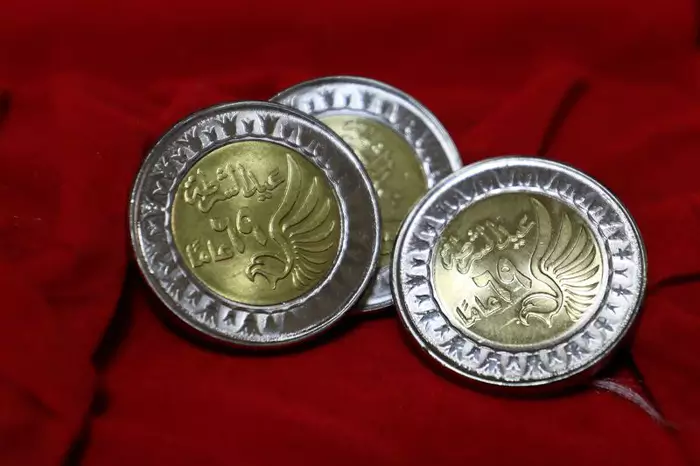Egyptian pound drops 11% after Ukraine war prompts dollar flight

Egyptian pound drops: By Patrick Werr and Nadine Awadalla CAIRO (Reuters) -Egypt’s pound depreciated more than 11% on Monday after weeks of pressure on the currency as foreign investors pulled out billions of dollars from Egyptian treasury markets following Russia’s invasion of Ukraine.

By Patrick Werr and Nadine Awadalla
CAIRO (Reuters) -Egypt’s pound depreciated more than 11% on Monday after weeks of pressure on the currency as foreign investors pulled out billions of dollars from Egyptian treasury markets following Russia’s invasion of Ukraine.
The pound dropped to 17.72-17.82 against the dollar, Refinitiv data showed, after having traded at around 15.7 pounds to the dollar since November 2020.
The central bank also hiked overnight interest rates by 100 basis points in a surprise monetary policy meeting.
Egypt has been in discussions with the International Monetary Fund about possible assistance, people close to the negotiations have said, but it has not announced any formal request.
Analysts at investment bank JP Morgan said two weeks ago that the pound was 15% over-valued and a devaluation was likely to be required, adding that Egypt may need further IMF help if financial market pressures intensified.
Monday’s weakening of the pound could catalyse inflows of foreign currency, while investors who already had money in Egyptian treasuries would be unlikely to sell now, said Farouk Soussa, senior economist at Goldman Sachs.
“The move is designed to trap liquidity in the market and bring in investors who might be sitting on the sidelines waiting for the pound to bottom out,” he said.
But it would also likely add to inflation and possible local dollarisation. “The big question is whether this is enough, or if more might be needed to entice portfolio investors,” he said.
HIGHER WHEAT IMPORT PRICES
Egyptian pound drops: Shortages of dollars have led to blockages at Egyptian ports, after importers could not obtain necessary foreign currency for letters of credit to get their goods cleared, bankers said.
The war in Ukraine has also left Egypt facing higher costs for its substantial wheat import needs as well as a loss in tourism revenue from Russian and Ukrainian visitors to Red Sea resorts. Russia and Ukraine are the main suppliers of wheat to Egypt, which is often the world’s largest importer.
The higher wheat prices could nearly double annual state spending on wheat imports to $5.7 billion, according to a study last week by the International Food Policy Research Institute, straining government finances and fuelling inflation pressure.
Egyptian pound drops
Headline inflation has accelerated to its highest level in nearly three years, registering 8.8% last month and touching the upper limit of the central bank’s 5-9% target range.
Prime Minister Moustafa Madbouly set the price of unsubsidised bread on Monday at 11.5 Egyptian pounds ($0.66) per kilogram, according to a statement from his office. Prices had jumped as much as 25% because of disruption to wheat imports caused by Russia’s offensive in Ukraine.
The central bank cited global inflationary pressures amplified by the war in Ukraine for its hike in rates, which lifted the overnight lending rate to 10.25% and its overnight deposit rate to 9.25%.
State-owned Banque Misr and National Bank of Egypt said on Monday they were offering certificates of deposit with yield of 18%.
(Additional reporting by Ahmed Ismail; Editing by Ed Osmond and Dominic Evans)






